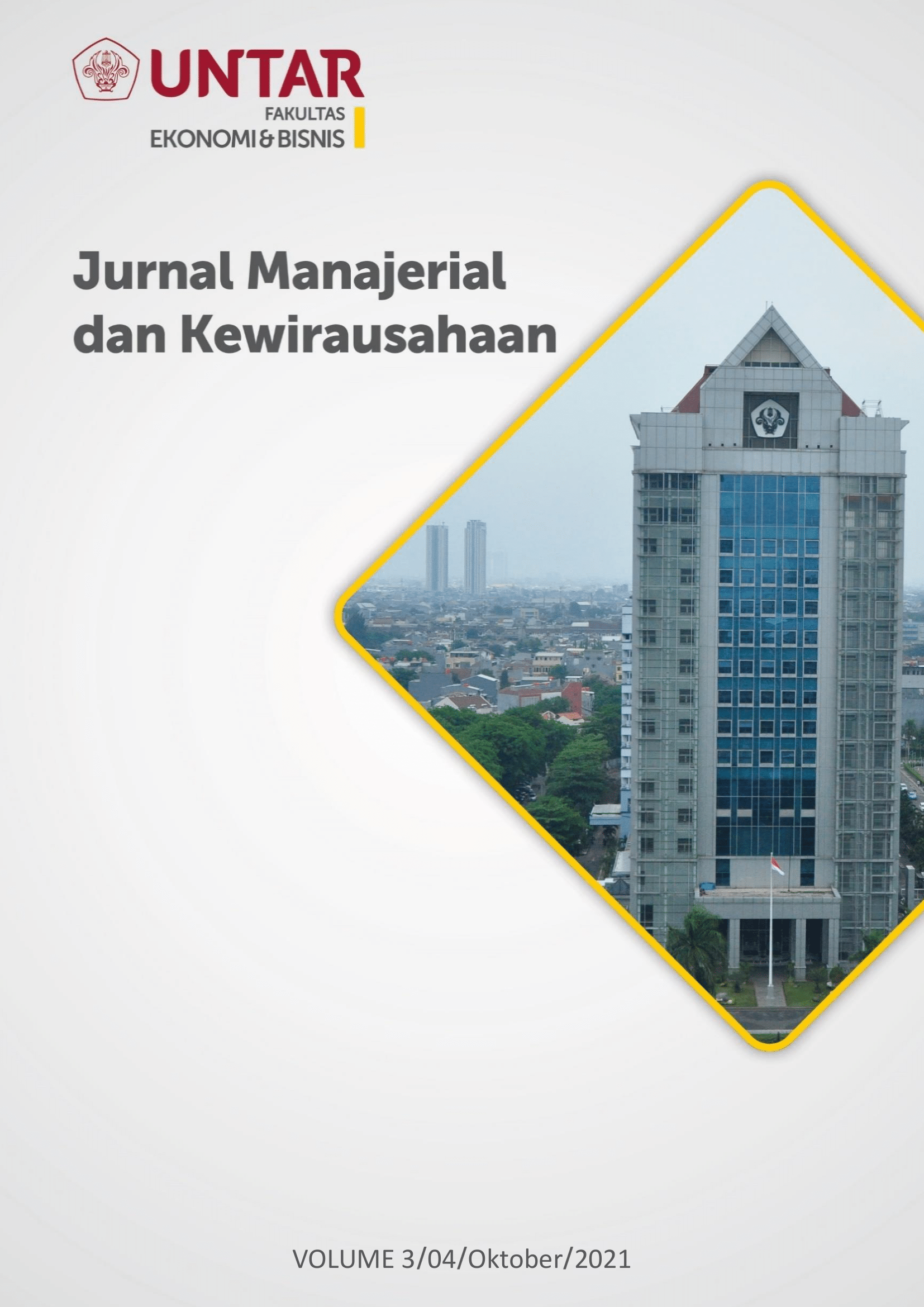Pengaruh: Financial Attitude, Financial Knowledge Locus Of Control Terhadap Perilaku Manajemen Keuangan
Main Article Content
Abstract
This study aims to analyze the influence of financial attitude, financial knowledge and locus of control on financial management behavior in 212 students of the Faculty of Economics and Business, Tarumanagara University. The sample was selected using convenience sampling method. The data analysis technique was using Structural Equation Models (SEM) with Smart-PLS version 3.3.3. The results of this study reveals that financial attitude and financial knowledge have an influence on financial management behavior, while locus of control have no effect on financial management behavior.
Penelitian ini dilakukan untuk mengetahui pengaruh financial attitude, financial knowledge dan locus of control terhadap perilaku manajemen keuangan pada 212 mahasiswa Fakultas Ekonomi dan Bisnis Universitas Tarumanagara. Teknik pemilihan sampel yang digunakan adalah metode convenience sampling. Teknik analisis data menggunakan Structual Equation Models (SEM) dengan program Smart-PLS versi 3.3.3. Hasil penelitian menunjukkan bahwa financial attitude dan financial knowledge berpengaruh terhadap perilaku manajemen keuangan, sedangkan locus of control tidak berpengaruh terhadap perilaku manajemen keuangan.
Article Details
Section
This work is licensed under a Jurnal Muara Ilmu Ekonomi dan Bisnis Creative Commons Attribution-ShareAlike 4.0 International License.,/p>
References
Alexander, R., & Pamungkas, A. S. (2019). Pengaruh Pengetahuan Keuangan, Lokus Pengendalian Dan Pendapatan Terhadap Perilaku Keuangan. Jurnal Manajerial Dan Kewirausahaan, 1(1), 157–164. https://journal.untar.ac.id/index.php/JMDK/article/view/2798
Amanah, E., Iradianty, A., & Rahardian, D. (2016). The Influence of Financial Knowledge, Financial Attitude and External Locus of Control on Personal Financial Management Behavior Case Study of Bachelor Degree Student in Telkom University. E-Proceeding of Management, 3(2), 1228–1235.
Anuraga, G., Sulistiyawan, E., & Munadhiroh, S. (2017). Structural Equation Modeling – PLS Untuk Pemodelan IPKM Jawa Timur, 257–263.
Bapat, D. (2020). Antecedents to responsible financial management behavior among young adults: moderating role of financial risk tolerance. International Journal of Bank Marketing, 38(5), 1177–1194. https://doi.org/10.1108/IJBM-10-2019-0356
Borden, L. M., Lee, S. A., Serido, J., & Collins, D. (2008). Changing college students’ financial knowledge, attitudes, and behavior through seminar participation. Journal of Family and Economic Issues, 29(1), 23–40. https://doi.org/10.1007/s10834-007-9087-2
Bougie, & Sekaran. (2013). Research Methods for Business: A skill Building Approach. John Wiley & Sons.
Dew, J., & Xiao, J. J. (2011). The financial management behavior scale: Development and validation. Journal of Financial Counseling and Planning, 22(1), 43–59.
Dewi, V. I., Febrian, E., Effendi, N., & Anwar, M. (2020). Financial literacy among the millennial generation: Relationships between knowledge, skills, attitude, and behavior. Australasian Accounting, Business and Finance Journal, 14(4), 24–37. https://doi.org/10.14453/aabfj.v14i4.3
Elliehausen, G., Lundquist, E. C., & Staten, M. E. (2007). The impact of credit counseling on subsequent borrower behavior. Journal of Consumer Affairs, 41(1), 1–28. https://doi.org/10.1111/j.1745-6606.2006.00066.x
Hair, J. F., Sarstedt, M., Hopkins, L., & Kuppelwieser, V. G. (2014). Partial least squares structural equation modeling (PLS-SEM): An emerging tool in business research. European Business Review, 26(2), 106–121. https://doi.org/10.1108/EBR-10-2013-0128
Herdjiono, I., & Damanik, L. A. (2016). Pengaruh Financial Attitude,Financial Knowledge, Parental Income Terhadap Financial Management Behavior. Jurnal Manajemen Teori Dan Terapan| Journal of Theory and Applied Management, 9(3), 226–241. https://doi.org/10.20473/jmtt.v9i3.3077
Ida, & Dwinta, C. Y. (2010). Pengaruh Locus Of Control, Financial Knowledge, Income Terhadap Financial Management Behavior. Jurnal Bisnis Dan Akuntansi, 12(3), 131–144.
Kholilah, N. Al, & Iramani, R. (2013). Studi Financial Management Behavior Pada Masyarakat Surabaya. Journal of Business and Banking, 3(1), 69. https://doi.org/10.14414/jbb.v3i1.255
Lee, H. W. (2013). Locus of control, socialization, and organizational identification. Management Decision, 51(5), 1047–1055. https://doi.org/10.1108/MD-11-2012-0814
Malhotra, N. (2015). Essentials of Marketing Research: A Hands-On Orientation. Pearson Education.
Mien, N. T. N., & Thao, T. P. (2015). Factors Affecting Personal Financial Management Behaviors Evidence from Vietnam. Proceedings of the Second Asia-Pacific Conference on Global Business, Economics, Finance and Social Sciences (AP15 Vietnam Conference). https://doi.org/10.1161/01.HYP.0000200705.61571.95
Paluri, R. A., & Mehra, S. (2016). Financial attitude based segmentation of women in India: an exploratory study. International Journal of Bank Marketing, 34(5), 670–689. https://doi.org/10.1108/IJBM-05-2015-0073
Pradiningtyas, T. E., & Lukiastuti, F. (2019). Pengaruh Pengetahuan Keuangan dan Sikap Keuangan terhadap Locus of Control dan Perilaku Pengelolaan Keuangan Mahasiswa Ekonomi. Jurnal Minds: Manajemen Ide Dan Inspirasi, 6(1), 96. https://doi.org/10.24252/minds.v6i1.9274
Ramalho, T. B., & Forte, D. (2019). Financial literacy in Brazil – do knowledge and self confidence relate with behavior? RAUSP Management Journal, 54(1), 77–95. https://doi.org/10.1108/RAUSP-04-2018-0008
Riitsalu, L., & Murakas, R. (2019). Subjective financial knowledge, prudent behaviour and income: The predictors of financial well-being in Estonia. International Journal of Bank Marketing, 37(4), 934–950. https://doi.org/10.1108/IJBM-03-2018-0071
Robb, C. A., & Woodyard, A. S. (2011). Financial Knowledge and Best Practice Behavior. Journal of Financial Counseling and Planning, 22(1), 60–70.
Saurabh, K., & Nandan, T. (2018). Role of financial risk attitude and financial behavior as mediators in financial satisfaction: Empirical evidence from India. South Asian Journal of Business Studies, 7(2), 207–224. https://doi.org/10.1108/SAJBS-07-2017-0088
Sugiyanto, T., Radianto, W. E., Efrata, T. C., & Dewi, L. (2019). Financial Literacy, Financial Attitude, and Financial Behavior of Young Pioneering Business Entrepreneurs, 100(Icoi), 353–358. https://doi.org/10.2991/icoi-19.2019.60
Widjaja, I., Arifin, A. Z., & Setini, M. (2020). The effects of financial literacy and subjective norms on saving behavior. Management Science Letters, 10(15), 3635–3642. https://doi.org/10.5267/j.msl.2020.6.030
Yap, R. J. C., Komalasari, F., & Hadiansah, I. (2016). The Effect of Financial Literacy and Attitude on Financial Management Behavior and Satisfaction. International Journal of Administrative Science & Organization, 23(3), 140–145

